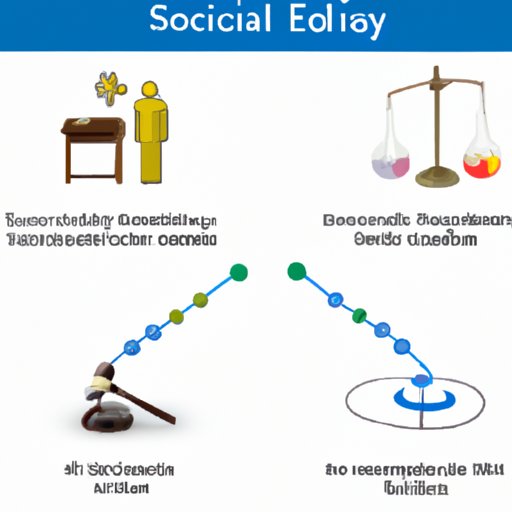Introduction
The scientific method is a systematic approach to problem-solving and inquiry. It involves formulating a hypothesis, testing it through experimentation, analyzing the results, and drawing conclusions. While the scientific method has been invaluable in advancing our understanding of the world, it is not without its limitations. This article will explore some of the potential challenges associated with the scientific method and science more broadly.

Examining the Impact of Social and Political Factors on Scientific Inquiry
Social and political factors can have a significant impact on scientific inquiry. According to Philip Kitcher, professor of philosophy at Columbia University, “In any society, much of what counts as science is shaped by non-scientific considerations” 1. These considerations include societal expectations and government policies.
Impact of Societal Expectations
Societal expectations can influence the types of research questions that are asked and the methods used to answer them. For example, women scientists have historically faced gender-based discrimination and unequal access to resources. As a result, their contributions to science have been overlooked or undervalued 2. Similarly, research topics that are deemed controversial, such as those related to sexuality or race, may be discouraged due to societal norms.
Influence of Government Policies
Government policies can also shape scientific inquiry. For example, in the United States, funding for basic research is largely determined by the federal budget. This means that certain areas of research, such as those related to climate change or renewable energy, may receive less attention if they are not priorities for the current administration 3. Additionally, government regulations can limit the types of experiments that can be conducted.
Exploring the Ethical Implications of Scientific Research
The ethical implications of scientific research must also be taken into account. In recent years, there have been numerous scandals involving unethical practices, such as the Tuskegee syphilis experiment in which African American men were unknowingly exposed to the disease 4. To prevent similar incidents from occurring, researchers must adhere to established guidelines for ethical conduct.
Guidelines for Ethical Conduct
Researchers should follow the guidelines set forth by the Belmont Report, which outlines three core principles for ethical conduct: respect for persons, beneficence, and justice 5. Respect for persons requires researchers to obtain informed consent from participants and protect their privacy. Beneficence requires researchers to do no harm, while justice requires them to ensure that benefits and risks are distributed fairly among all involved.
Responsible Use of Data
It is also important for researchers to use data responsibly. This includes accurately representing data and avoiding misinterpretation or manipulation. As noted by James G. Anderson, professor of atmospheric sciences at Harvard University, “Data should be collected, analyzed, and reported in ways that are transparent, reproducible, and verifiable” 6. By adhering to these standards, researchers can ensure that their findings are reliable and accurate.

Investigating the Role of Economics in Scientific Progress
Economic factors can also affect scientific progress. Funding sources and access to resources are two key considerations. Without adequate funding, researchers may be unable to pursue their work, while limited access to resources can impede progress.
Funding Sources
Research projects require significant financial support in order to be successful. Funding is often provided by governments, corporations, foundations, or universities 7. However, it can be difficult to secure funding for certain types of research, such as those related to social issues or environmental protection, due to political pressures or economic constraints. Additionally, some research projects may be deemed too risky or expensive for potential funders to invest in.
Access to Resources
Access to resources is another important factor in scientific progress. This includes physical resources, such as laboratory equipment and computers, as well as intellectual resources, such as expert advice or peer review. Researchers in developing countries, for example, may face challenges in accessing the resources they need to pursue their work 8.
Understanding the Role of Bias in Scientific Findings
Bias can also play a role in scientific findings. According to the National Academy of Sciences, “Bias can arise from many sources, including personal beliefs, cultural assumptions, and researcher expectations” 9. It is important for researchers to be aware of potential sources of bias and take steps to minimize their influence.
Personal Beliefs
Personal beliefs can lead to biased interpretations of data. For example, a researcher may be inclined to favor certain theories or conclusions based on their own values or experiences. To avoid this type of bias, researchers should strive to maintain objectivity and remain open to different interpretations of the data.
Cultural Assumptions
Cultural assumptions can also lead to biased findings. For example, a study conducted in one country may not be applicable to other cultures due to differences in values and beliefs. To reduce the risk of bias, researchers should strive to consider the broader context of their research and understand how cultural factors may influence their results.

Analyzing the Relationship Between Religion and Science
Finally, the relationship between religion and science must be considered. Historically, there has been tension between the two, with each side viewing the other as incompatible. However, some argue that this need not be the case, as both science and religion can provide valuable insights into the world around us 10.
Historical Conflict
The conflict between religion and science has a long history. For centuries, religious institutions have sought to suppress scientific progress by deeming certain topics off-limits or by punishing scientists who challenge established beliefs. This has created an environment in which science and religion are seen as being at odds with one another.
Competing Worldviews
At the same time, it is important to recognize that science and religion are based on different worldviews. Science relies on empirical evidence and logical reasoning, while religion is based on faith and tradition. As such, they can provide complementary perspectives on the same issue.
Conclusion
This article has explored some of the potential limitations of the scientific method and science more broadly. Social and political factors, ethical implications, economics, bias, and religion can all influence scientific inquiry. It is important for researchers to be aware of these factors and take steps to minimize their impact. By doing so, they can help ensure that their findings are reliable and accurate.
(Note: Is this article not meeting your expectations? Do you have knowledge or insights to share? Unlock new opportunities and expand your reach by joining our authors team. Click Registration to join us and share your expertise with our readers.)
